This is how humans react when AI takes over our work
In the column series "What the world would be like, if..." Elcke Vels explores intriguing scenarios that deviate from the status quo.
Published on June 28, 2025

Our DATA+ expert and Editor-in-Chief, Elcke Vels, explores AI, cyber security, and Dutch innovation. Her "What if..." column imagines bold scenarios beyond the norm.
One cup of coffee – and I'm ready to go. Today is a work-from-home day, and I'm not dreading it. As a tech journalist, I talk to passionate entrepreneurs and smart researchers every day, and I can express my creativity in writing stories like this one. I've been doing this for years. Still, I notice that things are changing in my field, especially because of AI: from translations to brainstorming about topics with ChatGPT. In this column, I sketch a future scenario in which AI, robots, and other advanced systems take over human work.
A journalist fifty years ago had a completely different job than I do today. I sit behind my laptop, my fingers flying across the keyboard. In a few minutes, I will have an AI generate an image to accompany this piece—a visual translation of my thoughts, created in seconds. How different it used to be. A journalist would sit hunched over their desk, surrounded by newspaper clippings, pencil notes, and a typewriter.
Looking back is easy. But looking ahead? That's a different story. Especially now, in the eye of the storm called artificial intelligence. The rise of AI is fueling global fears of job losses. Think tanks predict that AI could replace up to 8 million jobs in the coming years.
Will work as we know it still exist? What if... machines not only cooperate with us, but take over our work? What will we, humans, do then? And won't we be bored to death?
The next 20 years
First, the good news. In a world dominated by AI, hundreds of new jobs will also be created. For the next twenty years or so, we will still be working closely with AI. This will require new skills, so courses in AI, data analysis, and ethics will spring up like mushrooms in the coming years. In the Netherlands, too, the number of ICT studies and AI minors is growing rapidly. And the work? It is surprisingly varied. Think of AI trainers who teach algorithms how people think, prompt engineers who intelligently control AI systems, or AI fact checkers who check whether a model is spouting nonsense.
However, many jobs will also disappear in the coming decades. Cashiers, customer service representatives, administrative staff, translators: eventually, they will be a thing of the past.
In short: sooner or later – who knows when? – working life will change dramatically. While some jobs will disappear, new ones will be created. In any case, everyone will increasingly use AI systems, from government to start-ups.
Working in the distant future
In the longer term, AI will move towards more complex professions. Lawyers who pore over documents and doctors who make diagnoses will all have to deal with smart systems that are faster, cheaper, and more accurate.
Now that AI has developed so far, and thousands of scientific studies have been conducted worldwide on, among other things, the accuracy of AI in diagnosing cancer, we see that it is no longer strictly necessary for every step to be checked by a human being. Whereas previously we always saw this as a necessity.
The economy is shifting
Working as we knew it is no longer the norm. In a future where AI and machines perform almost all productive tasks, our economy is undergoing a fundamental change. Instead of paying people for their labor, the focus is shifting to ownership of capital and technology—the so-called “ownership economy.”
People who own AI systems, robots, or data platforms receive a share of the profits, so income is no longer directly linked to work.
Boredom? No way
Are we going to be bored en masse? Probably not, because humans are not made to do nothing. We always need something to do, otherwise we don't function well — mentally and physically. We will make art, start social projects. Things like that. Thanks to AI, we can focus on what people are good at.
A pushback: a longing for imperfection
We now live in a perfect world. Precisely because machines are so perfect and efficient, effortlessly taking over all tasks, there is a growing appreciation for what makes us human—with all our imperfections and quirks. People increasingly long for handmade things. Music festivals, art galleries: we appreciate them more and more. The ideal of beauty is also shifting toward the imperfect. After all, we are bombarded with perfect AI images. It is starting to become boring. Faces with individuality: that is what people value.
Human zones
One last noteworthy development: “human zones” are emerging—locations where AI and other advanced systems are deliberately excluded. Here, it's all about real connection: deep conversations, and cooking together. A kind of refuge.
ChatGPT: a clumsy intern
Back to the present. Admittedly, I already use ChatGPT regularly as a sparring partner. But when I see how many mistakes the system still makes sometimes—from flawed reasoning to arithmetic errors in simple sums—I'm not worried about the end of my own job just yet. For now, AI feels more like a somewhat clumsy intern: helpful, certainly, but one who still needs a lot of guidance. I'm sleeping well for now.

What if...
In the column series "What the world would be like, if..." Elcke Vels explores intriguing scenarios that deviate from the status quo.
